Kazakhstan 2
Listen to Kazakhstan 2, a 21-year-old woman from Astana, Aqmola, Kazakhstan. Click or tap the triangle-shaped play button to hear the subject.
Both as a courtesy and to comply with copyright law, please remember to credit IDEA for direct or indirect use of samples. IDEA is a free resource; please consider supporting us.
BIOGRAPHICAL INFORMATION
AGE: 21
DATE OF BIRTH (DD/MM/YYYY): 16/07/1996
PLACE OF BIRTH: Astana, Aqmola, Kazakhstan
GENDER: female
ETHNICITY: Kazakh
OCCUPATION: student
EDUCATION: fourth year of bachelor studies in foreign languages
AREA(S) OF RESIDENCE OUTSIDE REPRESENTATIVE REGION FOR LONGER THAN SIX MONTHS:
The speaker has not lived anywhere other than Astana, Kazakhstan, for longer than six months.
OTHER INFLUENCES ON SPEECH:
For the last six years, the speaker has been babysitting children from the United States, Canada, and Finland who are residing in Astana. She also studied at the University of Evansville, Evansville, Indiana, the United States, from January to May 2016. The speaker spent three months in Niagara Falls, Canada, visiting the Canadian family whom she worked for in Astana.
The text used in our recordings of scripted speech can be found by clicking here.
RECORDED BY: Akbota Medeubayeva (subject)
DATE OF RECORDING (DD/MM/YYYY): 21/04/2018
PHONETIC TRANSCRIPTION OF SCRIPTED SPEECH: N/A
TRANSCRIBED BY: N/A
DATE OF TRANSCRIPTION (DD/MM/YYYY): N/A
ORTHOGRAPHIC TRANSCRIPTION OF UNSCRIPTED SPEECH:
Well, I was born in Kazakhstan, Astana, and I am 21 years old. Uh, I have been traveling for a little bit. I’ve been to the States, and I’ve been to Canada. I’ve been to England, so I would say I heard a lot of different, um, speeches, and I guess I kinda copy them. Uh, so what I was — uh, what I would like to share with you is a story of my family — I would say just — traditions because I had a chance to, um, see how different our traditions are in comparison with Western culture. One thing that is particularly different is the family bond and how, for example, in my country — in Kazakhstan — we all really close with our family; we usually live with our parents until we get married, especially girls. I mean I don’t know anyone who moved out from their parents’ house. I mean, of course, if they go to study somewhere else or work, but usually it’s just you get married and then you move out, whereas in the States I know that by the age of 18-19, you are supposed to move out; like you are expected to do that. And I kinda like it ’cause it makes you more independent, but also, um, I like that we always have this parents’ support and our family support here in Kazakhstan; whereas, I feel like in the States, people are very dependent on their own. Um, so, yeah, that’s one thing that I noticed. But sometimes I struggle with it because I can’t explain to my family that sometimes I need more of my personal space, personal time; I want to — I would actually like to move out because I am 21, and I wanna start my like — I don’t know — adult life. But, yeah, they don’t see this happening unless I like move somewhere to study or get married, which I am not planning to do anytime yet. This is another thing that, in Kazakhstan, people get married really young. I wouldn’t say really young, but they are expected to get married — I mean girls, before they are just 23, which I think is a little too early.
So this is what I’m gonna read in Russian, just something that I like, uh, saying: little text. OK. [Subject speaks in Russian]: Человеческое счастье сегодня состоит в том, чтобы развлекаться. Развлекаться это значит получать удовольствие от употребления и потребления товаров, зрелищ, пищи, напитков, сигарет, людей, лекций, книг, кинокартин — все потребляется, поглощается. Мир это один большой предмет нашего аппетита, большое яблоко, большая бутылка, большая грудь; мы — сосунки, вечно чего-то ждущие, вечно на что-то надеющиеся — и вечно разочарованные.
[Transliteration: Chelovecheskoe schast’e segodnya sostoit v tom, chtoby razvlekat’sya. Razvlekat’sya eto znachit poluchat’ udovol’stvie ot upotrebleniya i potrebleniya tovarov, zrelish’, pishi, napitkov, sigaret, lyudej, lekcij, knig, kinokartin — vse potreblyaetsya, pogloshaetsya. Mir eto odin bol’shoj predmet nashego appetita, bol’shoe yabloko, bol’shaya butylka, bol’shaya grud’; my — sosunki, vechno chego-to zhdushie, vechno na chto-to nadeyushiesya — i vechno razocharovannye.] [English translation: Man’s happiness today consists in “having fun.” Having fun lies in the satisfaction of consuming and “taking in” commodities, sights, food, drinks, cigarettes, people, lectures, books, movies — all are consumed, all swallowed. The world is one great object for our appetite, a big apple, a big bottle, a big breast; we are the sucklers, the eternally expectant ones, the hopeful ones — and the eternally disappointed ones.― Erich Fromm, The Art of Loving]
TRANSCRIBED BY: Akbota Medeubayeva (subject)
DATE OF TRANSCRIPTION: 21/04/2018
PHONETIC TRANSCRIPTION OF UNSCRIPTED SPEECH: N/A
TRANSCRIBED BY: N/A
DATE OF TRANSCRIPTION (DD/MM/YYYY): N/A
SCHOLARLY COMMENTARY: N/A
COMMENTARY BY: N/A
DATE OF COMMENTARY (DD/MM/YYYY): N/A
The archive provides:
- Recordings of accent/dialect speakers from the region you select.
- Text of the speakers’ biographical details.
- Scholarly commentary and analysis in some cases.
- In most cases, an orthographic transcription of the speakers’ unscripted speech. In a small number of cases, you will also find a narrow phonetic transcription of the sample (see Phonetic Transcriptions for a complete list). The recordings average four minutes in length and feature both the reading of one of two standard passages, and some unscripted speech. The two passages are Comma Gets a Cure (currently our standard passage) and The Rainbow Passage (used in our earliest recordings).
For instructional materials or coaching in the accents and dialects represented here, please go to Other Dialect Services.
 IDEA: International Dialects of English Archive
IDEA: International Dialects of English Archive





